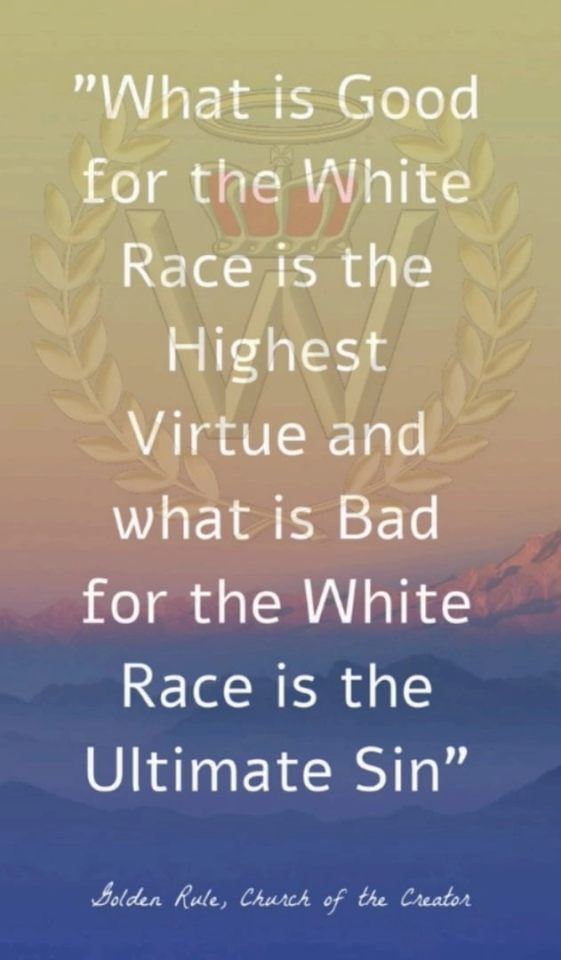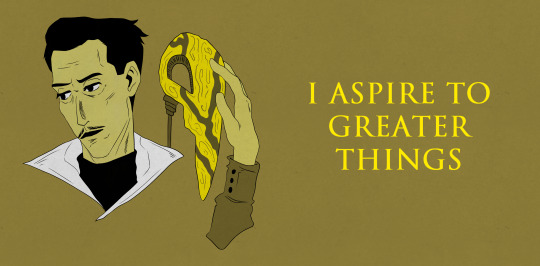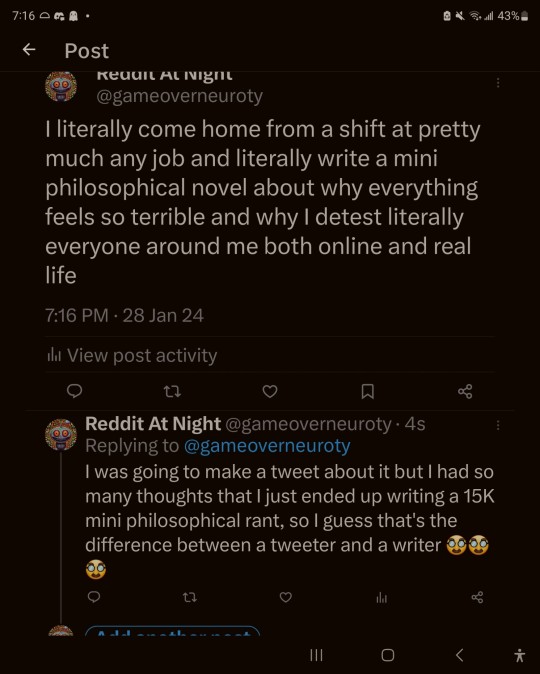#Philosophical Naturalism
Explore tagged Tumblr posts
Text
"people show their true colours in life threatening situations" no, they show you what they act like when they're mortally terrified, an emotion notorious for literally turning your entire brain off to the point where people who go into those situations as a profession need to be literally trained on how to not have that happen
#am i arguing with random 'philosophical' type villains in my own head?#yes#it's a favourite past time of mine i hate every one of those 'i know the true nature of humans because i did horrible things to them' types#with every part of my soul
104K notes
·
View notes
Text

1. If you were to sum up the objective of your religion, CREATIVITY, in one sentence what would that be?
A. That objective would be: The Survival, Expansion and Advancement of the White Race.
2. Why is that so important?
A. It is a matter of priorities. Our religion is based on the ultimate of all truths: The Eternal Laws of Nature. Nature tells each species to expand and upgrade itself to the utmost of its abilities. Since the White Race is Nature's finest achievement and since we encompass the White Race, there can hardly be any other goal that even compares in importance.
3. Isn't your religion based on hate?
A. No, on the contrary, it is based on love — love for the White Race. Besides being based on the Eternal Laws of Nature, CREATIVITY furthermore is based on the lessons of history, on logic and common sense.
4. But isn't it part and parcel of your religion to hate the Jews, blacks and other colored people?
A. True, but if you love and want to defend those whom you love — your own family, your own White Race, then hate for your enemies comes naturally and is inevitable. Love and hate are two sides of the same coin. Only a hypocrite and a liar will go into battle against his enemies proclaiming love.
5. But doesn't the Christian religion teach love and understanding, in fact, love your enemies, and yet it has survived?
A. The Christian religion is a good case in point when we talk about liars and hypocrites. Whereas they talk about love, the history of the Christian movement shows that they were as vicious and brutal in savagely hunting down their enemies, labeling them as "heretics" and burning them at the stake, torturing and killing them, as are the Jewish communists of today. Were the Christian church as powerful today as it was 400 years ago, it would still be doing it. During the various Inquisitions, the organized Christian churches killed millions of their own kind for having insignificant differences of religious opinion. They killed Christian rivals by open warfare, by the rack, by burning at the stake and other grizzly and gruesome means. In fact, the Christians over the centuries killed and tortured a thousand times more of their fellow-Christians, than the Romans ever did in their supposed persecutions.
6. But wasn't this done by people who were not following Christianity's teaching of love?
A. Since these killings, tortures, and persecutions were carried on by the highest leaders and authorities of the various Churches themselves, such as the Popes, by Zwingli, Luther, Calvin, etc., we must presume that the teachings of Christianity, which at best are ambiguous, contradictory and hypocritical, must be held responsible for producing these kinds of people and this kind of insanity. But if we turn to the New Testament, we find Christ himself dispensing such hateful advice as for example in Luke 14:26: "If any man come to me, and hate not his father, and mother and wife, and children, and brethren and sisters, yea and his own life also, he cannot be my disciple." What idiotic and destructive advice!
7. What then is CREATIVITY'S position on love and hate?
A. We follow the eternal wisdom of Nature's laws which are completely opposite to the suicidal teachings of Christianity. Whereas Christianity says to "love your enemies" and to hate your own kind, we say just the opposite. We say that in order to survive, we must overcome and destroy those that are a threat to our existence, namely, our deadly enemies. At the same time, we advocate love and protection for those that, are near and dear to us — our family and our own race, which is an extension of the family.
8. How does this differ from Christianity?
A. Christianity teaches love your enemies and hate your own kind, we teach exactly the opposite, namely hate and destroy your enemies and love your own kind. Whereas Christianity's teachings are suicidal, our creed brings out the best creative and constructive forces inherent in the White Race. Whereas Christians are destroyers, we are builders.
9. What do you mean by Christianity is a destroyer?
A. Christianity teaches such destructive advice as "love your enemies", "sell all thou hast and give it to the poor", "resist not evil", "judge not", "turn the other cheek." Anybody that followed such suicidal advice would soon destroy themselves, their family, their race and their country.
10. If Christianity is as destructive as you say it is, how do you explain the fact that it has survived for nearly 2,000 years?
A. Small pox has survived for longer than that, but the damage it has perpetrated on its victims has been devastating. Similarly, the creed and the church have survived for nearly 2,000 years, but the horrible damage it has wrought on the White Race is something else again. The Jews' primary objective in concocting Christianity was to destroy their mortal enemies, the Roman Empire. In this they were successful beyond their wildest dreams. Two thousand years ago, before the advent of Christianity, the Roman Empire had reached an astoundingly high level of civilization, art, literature, law-giving, road building, language, and in dozens of other fields that are the hallmarks of progress in the White Man's civilization. Beginning with the reign of Augustus Caesar, Rome enjoyed two centuries of peace and prosperity (known as Pax Romana), the longest such span in history. As Christianity spread, and more and more poisoned the Roman mind, the good Roman citizens lost touch with reality and their minds meandered off into the "never-never land" of the spooks in the sky, fueled by fear of that horrible torture chamber, HELL. The result was the collapse of the Roman Empire and the White Race retrogressed into chaos, barbarism, and a thousand years of the Dark Ages. Poverty, ignorance and superstition were rampant. Like a monster, the Christian church fed upon, and capitalized on these miseries. But the church itself grew fat and powerful.
11. Does CREATIVITY not believe in a hereafter?
A. No, we do not — because there is not the slightest shred of evidence of any "pie-in-the-sky-when-you-die," nor, thank goodness, do we believe in "fry-in-the-sky-when-you-die."
12. What do you believe in?
A. In order to get the full scope and breadth of our beliefs, you must read and study "NATURE'S ETERNAL RELIGION," and the WHITE MAN'S BIBLE.
13. What, in substance, is that belief?
A. The aim of our religion, briefly, is promoting the best interests of the White Race, the highest pinnacle of Nature's creation.
14. Do you have a "Golden Rule" in your religion?
A. Yes, we do have a Golden Rule in our religion, and it does not coincide at all with the Golden Rule generally accepted in the Jewish-Christian philosophy. Our Golden Rule briefly can be summarized as follows: That which is good for the White Race is the highest virtue: that which is bad for the White Race is the ultimate sin. See page 274 of NATURE'S ETERNAL RELIGION.
15. Don't you believe in the commonly accepted Golden Rule of Do unto others as you would have them do unto you?
A. No, we do not, and the reason we don't is that when you analyze it more closely, just like many of the other shibboleths of the Jewish-Christian Bible, the so-called Golden Rule does not make good sense. To quote some examples: We would not treat our enemies the same way as we would treat our friends. Our relationship to our employees would not be the same as to our boss. Our relationship to our children would not be the same as that to our parents. Our relationship to members of the White Race would not be the same as to members of the black race, for instance and we would not expect the same kind of response. The numbers of examples that could be quoted are endless, and on closer analysis, it is a completely unworkable principle.
16. Do you have an equivalent of the Ten Commandments in CREATIVITY?
A. We have the Sixteen Commandments which set forth the basic philosophy of our religious creed. However, our creed and our program are not limited to these 16 commandments, but the wider ramifications of our philosophy are spelled out in their totality in NATURE'S ETERNAL RELIGION, and this, the WHITE MAN'S BIBLE.
17. Upon what principles do you base the Sixteen Commandments?
A. They are based on the most solid foundations imaginable, namely, the Eternal Laws of Nature. On page 26 of NATURE'S ETERNAL RELIGION at the end of Chapter 1, we have listed 24 observations and conclusions from the Laws of Nature. Most of our beliefs, creed, philosophy, and in fact, our total program, are based on these 24 observations.
#Golden Rule#CREATIVITY#White Racial Religion#White Atheistic Racialists#Religious Naturalism#Philosophical Naturalism#Ben Klassen
1 note
·
View note
Text
The Philosophy of Evolution
The philosophy of evolution delves into the conceptual foundations and implications of evolutionary theory. It goes beyond the biological aspects to explore how evolutionary principles shape our understanding of nature, humanity, and knowledge. Philosophers of evolution engage with questions about the nature of change, the mechanisms of development, and the ethical ramifications of evolutionary processes. This field intersects with biology, ethics, epistemology, and metaphysics, offering a comprehensive view of how evolutionary thought influences various domains of life.
Key Themes in the Philosophy of Evolution
Nature of Evolutionary Change:
Philosophers examine the processes and mechanisms of evolutionary change, such as natural selection, genetic drift, and mutation.
They question the deterministic versus stochastic aspects of evolution and how these influence the predictability of evolutionary outcomes.
Concepts of Progress and Directionality:
The idea of progress in evolution is contentious. Philosophers debate whether evolution implies improvement or merely change.
They explore whether there is a directionality to evolution or if it is a non-teleological process driven by environmental and genetic factors.
Ethical Implications:
The application of evolutionary theory to ethics, often termed "evolutionary ethics," considers how natural selection and survival mechanisms influence moral behavior and values.
Philosophers critically assess concepts like "social Darwinism" and the ethical ramifications of applying evolutionary principles to social and political contexts.
Human Evolution and Identity:
The impact of evolutionary theory on understanding human nature, behavior, and societal development is a significant area of inquiry.
Philosophers analyze how evolutionary explanations of human traits and behaviors shape our self-conception and social structures.
Philosophical Naturalism:
Evolutionary theory supports a naturalistic worldview, emphasizing that natural processes suffice to explain the complexity of life.
This view challenges supernatural and teleological explanations, promoting a philosophy grounded in empirical science.
Epistemological Questions:
The reliability of human cognition, given its evolutionary origins, is a topic of interest. Philosophers debate whether our evolved cognitive faculties can produce true beliefs or if they are primarily geared towards survival.
This leads to discussions about the nature of knowledge and the trustworthiness of our cognitive processes.
Teleology and Function:
Evolutionary theory raises questions about the purpose and function of biological traits. Philosophers investigate whether teleological explanations (purpose-driven) can be reconciled with evolutionary mechanisms.
They explore the role of functions in biological explanations and how these relate to evolutionary history.
The philosophy of evolution is a rich and multidisciplinary field that provides profound insights into the nature of life and change. It challenges traditional views on progress, purpose, and human identity while offering a framework for understanding the complex interplay between organisms and their environments. By integrating biological principles with philosophical inquiry, this field fosters a deeper appreciation of the dynamic and interconnected nature of life.
#philosophy#epistemology#knowledge#learning#chatgpt#education#ontology#metaphysics#Evolutionary Philosophy#Natural Selection#Evolutionary Ethics#Human Evolution#Philosophical Naturalism#Teleology#Epistemology of Evolution#Nature of Change#Biological Functions#Evolutionary Theory#evolution
1 note
·
View note
Text
One of the recurring philosophical questions is:
"Does a falling tree in the forest make a sound when there is no one to hear?"
Which says something about the nature of philosophers, because there is always someone in a forest. It may only be a badger, wondering what that cracking noise was, or a squirrel a bit puzzled by all the scenery going upwards, but someone. At the very least, if it was deep enough in the forest, millions of small gods would have heard it.
Things just happen, one after another. They don't care who knows. But history...ah, history is different. History has to be observed. Otherwise it's not history. It's just...well, things happening one after another.
Terry Pratchett, Small Gods
#history monks#small gods#discworld#terry pratchett#history#causality#events#meaning#philosophy#philosophers#observation#reality#perception#knowledge#squirrels#badgers#the nature of philosophers#things just happen#if a tree falls in a forest
2K notes
·
View notes
Text

First Date Ideas
Skip the coffee date! Entice the next hottie you meet with a brand new experience✨
#alternative lives#helpful guide#list#niche guides#going mad#guide#aesthetic#edgy#nature#lover#letters#philosophy#philosopher#merry go round#vintage#vintage aesthetic#vintage cars#high speed car chase#clock#the passage of time#clockwork#date night ideas#date night#crush#my crush#boyfriend#girlfriend#girl blog aesthetic#girl blogger#girl blogging
269 notes
·
View notes
Text
i wanna see one of the tumblr girlies write a post sexualizing the library of babel in their absurd way. although i guess it already exists in there
AB DEFGHI LMNOP RSTU WXYZ
21/26
#and per se and#this is language related it counts#i pull a book off the shelf at the library of babel and the first page is ascii art of my di#no i love that story. trap your characters in a strange dungeon and spend 90% of it philosophizing the nature of the dungeon
212 notes
·
View notes
Text

The Philosopher's Path (哲学の道) Kyoto [京都], Japan March 2024 IG: tanzdreamer
#kyoto#me#京都#japan#日本#japanese#lensblr#mine#my photography#photography#urban#all black#sakura#cherry blossom#桜#さくら#nature#philosopher's path#哲学の道
127 notes
·
View notes
Quote
To be a philosopher you do not need to be a professor but you do have to love and understand nature.
Debasish Mridha
#quotes#Debasish Mridha#thepersonalwords#literature#life quotes#prose#lit#spilled ink#be-a-professor#debasish-mridha#debasish-mridha-md#gandhi#inspirational#love-nature#miraboli#oscar-wilde#philosophy#to-be-a-philosopher#understand-nature
44 notes
·
View notes
Text

sas rh: let eoin survive the fall au » the earth, the moon and the astronomer philosopher
#sas rogue heroes#eoin mcgonigal#paddy mayne#augustin jordan#sas:rh#sasrh:canonau#this is basically a companion image to my previous post/hc#augustin is sooooo fascinated by these two#separately but also and just as much by their dynamic ???#if anyone asks hes just trying to figure them out ??#he just has a curious nature#it's the philosopher in him#thats the only reason#why hes slowly wiggling his way in there#(and if anyone else takes notice of how *he* sort of starts orbiting *them* too. well no one says a word :/)
31 notes
·
View notes
Text

Victory of the Sea (Jan Saudek, 1992)
Jan Saudek's "Victory of the Sea" from 1992 is quite renowned. Saudek, a Czech photographer known for his surreal and provocative imagery, often explores themes of sexuality, mortality, and the human condition in his work. "Victory of the Sea" is a striking example of his style, blending the surreal with a deeply emotional and philosophical narrative. The piece combines elements of fantasy and reality, often invoking a sense of both beauty and discomfort.
P.s. What I call Dionysian Art
#quote art#dionysian#nature art#artwork#art#art style#art study#art stuff#dionysus#dionysus devotte#pagan#pagan witch#paganism#hellenic pagan#hellenic polytheism#philosophical
45 notes
·
View notes
Text




#dishonored#dishonored 2#kirin jindosh#alexandria hypatia#esmond roseburrow#anton sokolov#dishonored fanart#my art#SORRY i am OBSESSED with dishonored natural philosophers#these are all translations from more or less well-known latin expressions (lost myself on wikipedia again)#the age of enlightenment
253 notes
·
View notes
Text
Transmigating into mdzs to make Nie Mingjue read "On the permanent Impression of our Words and Actions on the Globe we inhabit" by Charles Babbage. Despite the profound impact i suspect it will have on him, this will not fix anything. As he instead becomes so annoying that Jin Guangyao kills both him and me instantly.
#you know the philosophy student who's just read a text they think is so life-changing they can fix the entire world with one book#yeah. that's exactly what he'll be like#'meng yao meng yao every single one of your lies is a wave of air that continues to affect the world long after anyone stopped hearing it'#'the atoms of your victims will remember your crimes and seek justice for long after you've ceased to exist meng yao'#'MENG YAO THE EARTH ITSELF REMEMBERS OUR ACTIONS'#actually jgy extrapolating the text and discovering atomic determinism would be even worse.#how can he be GUILTY of ANYTHING if it was just the inevitable consequence of natural forces da-ge?#mdzs#nie mingjue#meng yao#jin guangyao#what's more nieyao than murder over a philosophical concept
38 notes
·
View notes
Text


◇ Arthur Morgan ◇ Red Dead Redemption 2 ◇
#..just noticed that you could go all philosophical about this photo like arthur looking at flowers and nature wanting to be free and just#living while in the corner dark clouds are lurking around wanting to destroy his peaceful dreams and wishes and damn I need sleep#...just...still deeeeeeeeep inside the rdr2 hole and loving every second of it and yeah.....my ps5 storage is crying again#red dead redemption arthur#red dead redemption two#red dead redemption 2#red dead redemption#rdr2#arthur#arthur morgan
27 notes
·
View notes
Text

You could say that I have strong feelings about this ongoing debate
#critical role#we can all have coffee on Ludinus' grave and debate the nature of morality until we're blue in the face. but priorities.#cr spoilers#bell's hells#HHHHHHH false dichotomies are not a friend#the choice is not a binary Gods Or Predathos#and you should not pick Predathos just because you don't like the other option!!!!!#anyway i have uhhhh 15 memes that i made tonight because that is who i am as a person#also. also. hey. guys. everybody.#if your philosophical debate is leading you to go 'idk maybe the murderers are onto something'#boy HOWDY you better have the information to back that up!#the thing is I'm not mad this devate is happening i think it's very realistic that people would get caught up in this debate given the given#i have just painstakingly cultivated the ability to have an argument and i have strong feelings about rhetoric#[bangs on a pot lid with a spoon] CONSIDER ALL ANGLES BEFORE YOU DOUBLE DOWN ON A POSITION#if you're curious#yes i am EXACTLY like this in a real life argument i have been told i am infuriating to argue with#both because of my love of Sources and because of my need to be absolutely dead sure of something before i get in a fight about it#which have the annoying tendency to make me like. not lose a lot of fights.
286 notes
·
View notes
Text

#I don't understand how mentally ill people claim that they hate work#And don't come out of literally every single shift with about 5#with every single new shift with about at least 5#000#New thoughts about how wrong this all is and how detrimentally painful it is and why#I've literally started writing a multi-million word along philosophical rant#to certain fictional characters that I pretend are my partners because I'm in so much pain every day that I have so much to say#that not even ranting about it on the internet comes close at this point#it relates back to that whole philosophy about how mental illness naturally creates creativity#because I'm not even meaning to write this damn novel or philosophical paper.#it's just the fact that I literally have to or I feel like I'm going to implode
84 notes
·
View notes
Text
It's so wild to me when people treat the disco elysium world as any other fantasy world, with seemingly no ties to our real world and its geopolitics, when politics is such a big facet of the game? "Which disco elysium nation would you want to live in?!" My brother in Doloris Dei I already live here.
#disco elysium#rambling#this post is NOT about people who enjoy the worldbuilding in elysium#that's awesome and it deserves to get that attention#this is about people who seem to refuse to engage with the political and philosophical nature of the game#to the point that they don't seem to acknowledge the way this art is holding up a mirror and what it's trying to say#also this post is shaking hands with that other post about how people who make Harry and Kim different fantasy races in AUs missed the poin#anyway i live in sur-le-clef/oranjerijk and if that makes me uncomfortable bc of the glimpse we get of it in DE#then i should consider why that is and what role my country plays geopolitically!!#yes this was triggered by another reddit post
41 notes
·
View notes